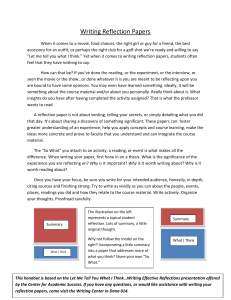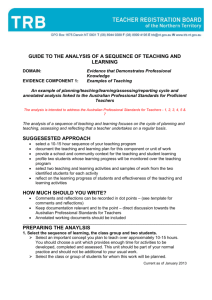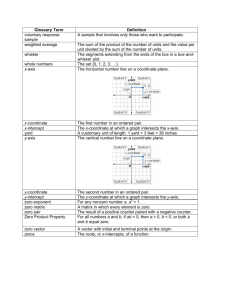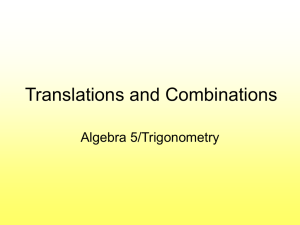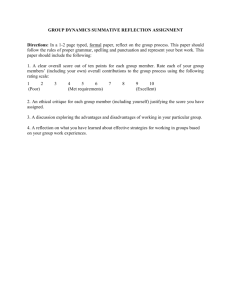Chapter 9 - Transformations
advertisement
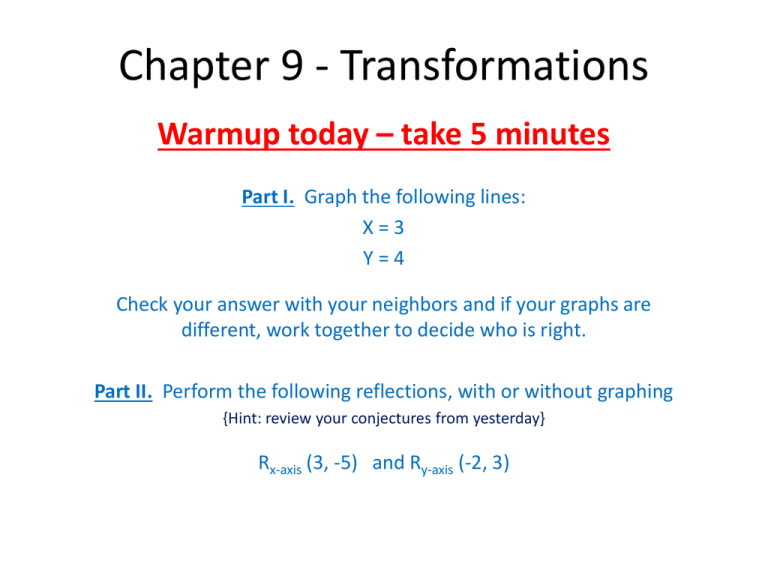
Chapter 9 - Transformations
Warmup today – take 5 minutes
Part I. Graph the following lines:
X=3
Y=4
Check your answer with your neighbors and if your graphs are
different, work together to decide who is right.
Part II. Perform the following reflections, with or without graphing
{Hint: review your conjectures from yesterday}
Rx-axis (3, -5) and Ry-axis (-2, 3)
Reflections (notation)
• Correct Notation = R line of reflection {object}
• Rx-axis ABCD
This “reflects” the quadrilateral ABCD over the x-axis.
• Ry-axisABCD
This “reflects” the quadrilateral ABCD over the y-axis.
• If the Pre-Image is labeled ABCD, the corresponding
vertices in the Image are named A’B’C’D’
Section 9.2 – Reflections
Reviewing yesterdays conjectures
• When reflecting a point (x, y) over the x-axis, the
x-coordinate stays the same and the y-coordinate
changes its sign -> (x, -y)
• Examples: Rx-axis (3, 4) = (3, -4), Rx-axis (-2, -5) = (-2, 5)
• When reflecting a point (x, y) over the y-axis, the
y-coordinate stays the same and the x-coordinate
changes its sign -> (-x, y)
• Examples: Ry-axis (3, 4) = (-3, 4), Ry-axis (-2, -5) = (2, -5)
Section 9.2 – Reflections
Two new conjectures
• When reflecting a point (x, y) over the line y = x, the
x-coordinate and the y-coordinate change places-> (y, x)
• Examples: Ry=x(3, 4) = (4, 3), Ry=x (-2, -5) = (-5, -2)
• When reflecting a point (x, y) over the line y = -x, the
x-coordinate and the y-coordinate change places and change
their signs-> (-y, -x)
• Examples: Ry=-x (3, 4) = (-4, -3), Ry=-x (-2, -5) = (5, 2)
Section 9.2 – Reflections
Reflecting over another horizontal or vertical line
• Step #1 – Draw the object or point that your are going to reflect.
• Step #2 – Draw the line that you are going to reflect over.
Reflecting over a vertical line (x = c) is similar to reflecting over the y-axis.
• Step #3 – for each point, find the horizontal distance between it and the line of
reflection. Use that same distance to locate the image of that point on the
other side of the line of reflection (the y-coordinate does not change).
Reflecting over a horizontal line (y = c) is similar to reflecting over the y-axis.
• Step #3 – for each point, find the vertical distance between it and the line of
reflection. Use that same distance to locate the image of that point on the
other side of the line of reflection (the x-coordinate does not change).
Reflecting an Object over
a vertical line (x = 2)
• Draw the Object (labeling
vertices)
• Draw the line of reflection
• Find the horizontal distance
between each point and the
line of reflection
• Draw the reflection on the
other side of the line using the
distances found in step 3
• Label the vertices of the Image
y
C’
Scale is 1 by 1
A’
A
B’
B
C
x
Reflecting an Object over
a horizontal line (y = -1)
y
Scale is 1 by 1
A
• Draw the Object (labeling
vertices)
• Draw the line of reflection
• Find the vertical distance
between each point and the
line of reflection
• Draw the reflection on the
other side of the line using the
distances found in step 3
• Label the vertices of the Image
B
C
x
B’
A’
C’
